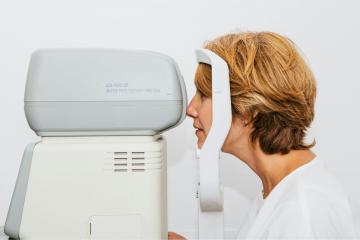
News
October 25, 2025
Menopausal women urged to get eye test after link to common eye condition
More than half of menopausal women suffer from dry eye syndrome, though many remain unaware of the link.
Menopausal women are being urged to schedule an eye test, as new findings highlight a significant connection between menopause and dry eye syndrome. Experts are concerned that a large proportion of women experiencing menopause are suffering from this common eye condition without realizing the underlying cause, or understanding that effective treatments are available.
Dry eye syndrome, characterized by insufficient lubrication on the surface of the eye, can manifest in a variety of uncomfortable symptoms. These include a gritty or sandy sensation, burning, stinging, blurred vision, light sensitivity, and even excessive tearing as the eye attempts to compensate for the dryness. While dry eye can affect anyone, the hormonal changes associated with menopause appear to significantly increase a woman's susceptibility.
The link lies in the fluctuating estrogen levels during menopause. Estrogen plays a crucial role in tear production and maintaining the health of the meibomian glands, tiny glands in the eyelids responsible for secreting oils that prevent tear evaporation. As estrogen levels decline, these glands can become less effective, leading to a decrease in tear quality and quantity, thus triggering dry eye symptoms.
"Many women attribute their dry, irritated eyes to allergies, screen time, or environmental factors, without realizing that menopause could be a contributing factor," explains Dr. Emily Carter, a leading ophthalmologist specializing in women's eye health. "This lack of awareness can delay diagnosis and treatment, leading to unnecessary discomfort and potentially affecting their quality of life."
The good news is that dry eye syndrome is manageable. A comprehensive eye exam can determine the severity of the condition and identify the underlying cause. Treatment options range from over-the-counter lubricating eye drops to prescription medications that stimulate tear production or reduce inflammation. In some cases, lifestyle changes such as increasing humidity in the home, taking breaks from screen time, and staying hydrated can also provide relief.
Eye care professionals are urging menopausal women experiencing any symptoms of dry eye to seek professional advice. Early diagnosis and appropriate management can significantly alleviate discomfort and prevent the condition from worsening. Regular eye exams are therefore crucial for maintaining eye health during this significant life stage.
Dry eye syndrome, characterized by insufficient lubrication on the surface of the eye, can manifest in a variety of uncomfortable symptoms. These include a gritty or sandy sensation, burning, stinging, blurred vision, light sensitivity, and even excessive tearing as the eye attempts to compensate for the dryness. While dry eye can affect anyone, the hormonal changes associated with menopause appear to significantly increase a woman's susceptibility.
The link lies in the fluctuating estrogen levels during menopause. Estrogen plays a crucial role in tear production and maintaining the health of the meibomian glands, tiny glands in the eyelids responsible for secreting oils that prevent tear evaporation. As estrogen levels decline, these glands can become less effective, leading to a decrease in tear quality and quantity, thus triggering dry eye symptoms.
"Many women attribute their dry, irritated eyes to allergies, screen time, or environmental factors, without realizing that menopause could be a contributing factor," explains Dr. Emily Carter, a leading ophthalmologist specializing in women's eye health. "This lack of awareness can delay diagnosis and treatment, leading to unnecessary discomfort and potentially affecting their quality of life."
The good news is that dry eye syndrome is manageable. A comprehensive eye exam can determine the severity of the condition and identify the underlying cause. Treatment options range from over-the-counter lubricating eye drops to prescription medications that stimulate tear production or reduce inflammation. In some cases, lifestyle changes such as increasing humidity in the home, taking breaks from screen time, and staying hydrated can also provide relief.
Eye care professionals are urging menopausal women experiencing any symptoms of dry eye to seek professional advice. Early diagnosis and appropriate management can significantly alleviate discomfort and prevent the condition from worsening. Regular eye exams are therefore crucial for maintaining eye health during this significant life stage.
Category:
Politics